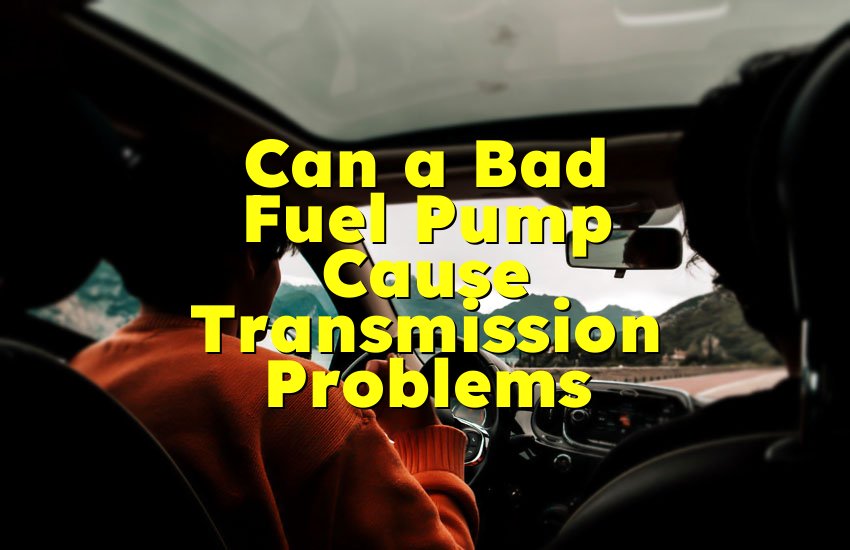As an Amazon Associate, I earn from qualifying purchases at no extra cost to you.
Can a Bad Fuel Pump Cause Transmission Problems? Expert Guide
A bad fuel pump can cause serious issues in your car, including transmission problems. Many drivers notice rough shifting, slipping gears, or delayed acceleration when their fuel pump starts failing. In this article, you will learn how a faulty fuel pump can affect your transmission and what signs to watch for. With clear steps, you can understand and fix the issue before it worsens.
Understanding How a Fuel Pump Works and Its Role
Your car's fuel pump is very important. It moves fuel from the tank to the engine. If it works poorly, the engine does not get enough fuel. Low fuel supply makes the engine weak, and this can affect other parts, including the transmission.
When the engine struggles due to low fuel, the transmission cannot shift smoothly. Automatic transmissions depend on engine power to change gears properly. A weak engine makes the transmission work harder and sometimes slip. Many drivers notice jerking or rough gear changes when the fuel pump is bad.
Another issue is that a failing fuel pump can cause uneven fuel flow. Sometimes the engine gets too much fuel, other times too little. This inconsistency can confuse the transmission sensors. Modern cars have computer systems that rely on smooth engine performance. A bad fuel pump makes the system send wrong signals to the transmission.
The fuel pump also helps maintain proper fuel pressure. If the pressure is low, the engine misfires or loses power. Transmission problems often appear as delayed response or slipping gears. This shows that a healthy fuel pump is important not only for the engine but also for smooth transmission operation.
- Fuel pump moves fuel to the engine.
- Low fuel affects engine performance.
- Weak engine causes rough gear changes.
- Uneven fuel flow can confuse transmission sensors.
- Low fuel pressure can lead to slipping gears.
Signs That a Fuel Pump Is Failing
You can notice fuel pump problems early if you watch carefully. One sign is your car struggling to accelerate. The engine may jerk or hesitate when you press the pedal. This happens because the fuel pump cannot supply enough fuel.
Another sign is unusual noise from the fuel tank. A whining or humming sound can indicate the pump is wearing out. If you hear this noise more when the tank is low, the pump is likely weak. Paying attention to these noises can help prevent bigger transmission problems.
You may also see stalling or sudden engine cuts. A bad fuel pump cannot keep a steady flow, so the engine stops unexpectedly. These sudden stops can cause stress on the transmission system. If the transmission shifts roughly after stalling, check the fuel pump first.
Fuel efficiency may drop too. If the pump is struggling, the engine burns fuel unevenly. This wastes fuel and creates more heat in the transmission. Heat damages transmission fluid and parts. Catching these signs early can save your car from costly repairs.
- Car hesitates or jerks when accelerating.
- Humming or whining noise from fuel tank.
- Engine stalls or stops unexpectedly.
- Rough transmission shifts after stalling.
- Reduced fuel efficiency and extra heat in transmission.
How Transmission Problems Appear From a Bad Fuel Pump
Transmission problems appear when the engine loses power. Automatic transmissions depend on steady engine speed to change gears. If the engine sputters, gears slip or shift late. Drivers often feel a delay or hard jerk during gear changes.
In some cars, transmission warning lights appear. The car's computer may detect low power or incorrect signals. A bad fuel pump indirectly triggers these warnings. It can also cause strange smells, like burning transmission fluid. This happens when the transmission overheats from extra work.
Sometimes the car may fail to accelerate while in gear. Even if the engine is running, the vehicle may feel weak. This is because the transmission does not receive enough force from the engine. Over time, continuous stress can damage the transmission completely.
Modern vehicles with electronic transmissions are sensitive. Sensors monitor fuel flow, engine speed, and transmission response. A failing fuel pump creates inconsistencies that confuse these sensors. This leads to erratic shifting, jerks, or gear slippage. Catching the issue early prevents major repairs.
- Engine power loss causes gear slipping.
- Transmission warning lights may appear.
- Vehicle struggles to accelerate in gear.
- Overheating damages transmission fluid.
- Sensor errors cause erratic gear changes.

Diagnosing Fuel Pump and Transmission Issues
Diagnosing these problems requires careful checks. Start by listening to the fuel pump. Whining, humming, or loud buzzing may show it is failing. Next, check engine performance while driving. Hesitation, stalling, or jerking can point to low fuel supply.
Check fuel pressure with a gauge. Low pressure confirms a weak fuel pump. Also, examine transmission behavior. Slipping, hard shifts, or delayed response often appear when the engine is underpowered. Combining these signs helps pinpoint the problem.
Computer diagnostics help too. Many mechanics use scan tools to check engine and transmission codes. These codes can show if sensors are detecting low fuel pressure or irregular engine signals. This method is quick and reliable.
Finally, inspect fuel filters and lines. Sometimes, clogging creates low fuel flow and mimics pump failure. Replacing clogged filters often fixes the problem without a new pump. Proper diagnosis prevents unnecessary transmission repairs.
- Listen for unusual fuel pump sounds.
- Observe engine hesitation or stalling.
- Measure fuel pressure with a gauge.
- Scan computer codes for errors.
- Check fuel filters and lines for clogs.
Fixing a Bad Fuel Pump Before Transmission Damage
Fixing a fuel pump early prevents transmission damage. If the pump is weak, replacing it restores fuel flow. A new pump ensures the engine receives enough fuel for smooth operation.
Always replace fuel filters at the same time. Clogged filters can harm a new pump or reduce efficiency. Using quality filters improves fuel delivery and engine health. This also reduces stress on the transmission.
After replacing the pump, test the car. Drive at different speeds and watch for hesitation or slipping gears. Transmission response should feel smooth and normal. If problems persist, professional inspection may be needed.
Regular maintenance is key. Check fuel lines, filters, and pump performance periodically. Small issues become big repairs if ignored. Protecting the fuel system also safeguards the transmission, saving money and stress in the long run.
- Replace weak fuel pump immediately.
- Change fuel filter with the pump.
- Test car performance after replacement.
- Monitor transmission response closely.
- Maintain fuel system to avoid future damage.
Preventing Transmission Issues From Fuel Problems
Preventing problems is better than fixing them. Keep your fuel pump and filters clean. Use high-quality fuel and avoid running the tank too low. Low fuel can strain the pump and engine.
Check your car for unusual noises or poor acceleration. Early detection prevents transmission damage. Regular servicing ensures sensors and transmission fluid stay healthy. Transmission fluid should be replaced per manufacturer recommendations.
Driving habits also matter. Avoid hard acceleration with a weak fuel pump. Smooth driving reduces stress on both engine and transmission. Inspect fuel system components during oil changes or routine checkups.
Finally, follow professional advice. Mechanics can detect early signs of pump or transmission issues. Ignoring small problems often leads to bigger, expensive repairs. Simple maintenance keeps your car running reliably.
- Keep fuel pump and filters clean.
- Avoid running tank too low.
- Check for unusual noises or poor acceleration.
- Replace transmission fluid regularly.
- Follow professional maintenance advice.
Final Thoughts
A bad fuel pump can easily affect transmission health. Early detection and proper care prevent serious damage. Replacing a weak pump, maintaining fuel filters, and watching engine behavior keeps both systems healthy. Smooth driving, regular checks, and high-quality fuel protect your car. Acting fast saves money and stress, ensuring reliable performance for years.
| Action | Tip |
|---|---|
| Listen for whining fuel pump | Indicates wear |
| Check fuel pressure | Use a gauge |
| Inspect engine behavior | Hesitation or stalling |
| Replace pump and filter | Restore smooth fuel flow |
| Monitor transmission | Watch for slips |
| Use quality fuel | Prevent pump strain |
| Maintain fluid and sensors | Avoid major damage |
| Regular servicing | Catch issues early |
Frequently Asked Questions (FAQs)
Is it possible for a bad fuel pump to damage transmission?
Yes, it is possible. A failing fuel pump can starve the engine of fuel. Low fuel supply weakens engine performance. Automatic transmissions rely on steady engine power to shift gears. When the engine struggles, the transmission slips or shifts late. Over time, this stress can cause overheating, fluid breakdown, and mechanical damage. Replacing the pump early prevents these problems.
Can a weak fuel pump cause slipping gears?
Yes, a weak fuel pump can cause slipping. The transmission depends on engine torque to engage gears. If the engine hesitates or loses power, gears may not fully engage. This creates slipping or delayed shifts. Drivers often notice jerks or hesitation when accelerating. Ensuring proper fuel delivery restores smooth gear changes and protects transmission components.
Do I need to replace the transmission if the fuel pump fails?
Not always. Transmission may remain healthy if you replace the pump early. Most problems are caused by low engine power, not transmission failure itself. If you fix the fuel pump quickly, gear shifts usually return to normal. However, prolonged pump failure can cause overheating and damage, which may require transmission service. Quick action prevents unnecessary replacement.
Is it normal for a bad fuel pump to make the car stall?
Yes, stalling is common with a bad pump. If the pump cannot supply enough fuel, the engine may stop unexpectedly. Stalling puts stress on the transmission, especially if it happens while the car is in gear. Replacing the pump and checking fuel lines usually fixes stalling. Early attention avoids further transmission problems.
Can fuel pump issues trigger transmission warning lights?
Yes, fuel pump problems can trigger warning lights. Modern vehicles monitor engine and transmission signals. Low fuel pressure or inconsistent flow can confuse the system. This may cause the transmission light or check engine light to appear. Diagnosing the fuel pump often solves the warning light issue.
Do I need special tools to check fuel pump pressure?
Yes, a fuel pressure gauge is needed. It accurately measures the pressure delivered to the engine. Mechanics use this to determine if the pump is weak. Proper measurement ensures you don't replace parts unnecessarily. Checking fuel pressure is an essential step before assuming transmission failure.
Is it safe to drive with a failing fuel pump?
It is risky. Driving with a bad pump may cause stalling, hesitation, or engine misfires. Transmission may also suffer from irregular power delivery. Long drives can overheat the transmission. Immediate repair or replacement of the fuel pump is safer. Avoiding stress on both engine and transmission prevents costly damage.
Can cleaning fuel filters fix transmission issues?
Sometimes yes. Clogged filters reduce fuel flow, mimicking pump failure. Cleaning or replacing filters restores fuel supply. Proper fuel flow ensures the engine delivers enough power for smooth transmission operation. While filters alone may not fix a failing pump, maintaining clean fuel helps prevent transmission stress.











